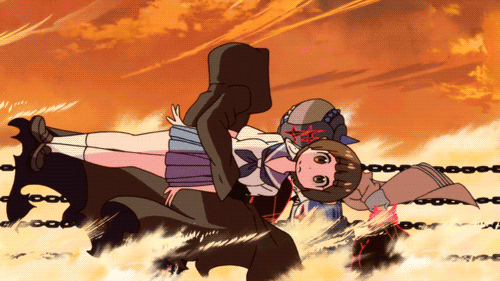 John Carmack infamously stated that “Story in a game is like story in a porn movie. It’s expected to be there, but it’s not that important.”
John Carmack infamously stated that “Story in a game is like story in a porn movie. It’s expected to be there, but it’s not that important.”
John Carmack be damned. Quality videogame storytelling exists, and it’s not secondary to the action. The narrative weaknesses of Carmack’s own RAGE game may have stirred me into writing this piece up, but I’ve been feeling an urge lately to expose one of the most powerful counterexamples to Carmack’s arguments. Here’s an author who has no professional connection to the game or writing industries, yet has managed to elegantly merge the two mediums together over and over again for three years. He does it as a hobby, for free, as a member of the Fallout modding community. Ladies and gentlemen, I present to you one of PC gaming’s best-kept secrets: Puce Moose.
Let me put aside any journalistic pretension of objectivity for a minute. This is an editorial and I’m expressing an opinion, so I feel safe in handing out this shameless endorsement: I’m George Weidman, and Puce Moose is my favorite person on the Internet.
Mr. Moose has built a considerable fanbase over the past three years by releasing a series of “thinking man’s” mods for Fallout 3 and New Vegas. They typically have the player rifle through the petrified remains of eccentric pre-apocalyptic character: an oddball college professor, a reclusive business tycoon, or a jaded anthropologist. They all follow the grand tradition of classic non-violent point-and-click adventure games, featuring dense environmental puzzles and lots of note-reading. For the most part, it’s pretty familiar Infocom-styled stuff, but his latest mod, “Tales from the Burning Sands,” shows a proficiency for interactive storytelling that simply blows me away. Ready for it? ‘Cause explaining this stuff is going to require a massive flood of spoilers.
Spoilers below. Scroll past this part if you plan on playing.
“Tales From the Burning Sands” begins like most other Puce Moose quests. After installing and loading up the mod, two decadent piano chords signal the mod’s activation. A message spontaneously appears in your inventory, with the first clue that eventually leads to you discovering the house of a M. Higginbottom, who, with a ridiculously pompous vocabulary and a pneumatic letter-delivery system, sends you on a medley of menial fetch-esque quests before meeting you in person. Quest one: destroy the old power pylon obstructing the view from his front porch. Quest two: cook his favorite soup, just like Dad used to make. Quest three: fix the mechanical elevator that leads up to his house. With these three tasks completed, it’s time to step on the elevator and meet Higginbottom in person.
Fetch quests have a way of creating tension, of building anxiety. After hours of time spent doing something that feels more like work than play, the excitement for a climatic face-to-face meeting with this character was nearly unbearable. But within just a matter of seconds, things get noticeably more eerie after completing the third quest.
The elevator works and ferries you up to his house, as expected, but no one greets you in the front yard. The pneumatic message delivery box is empty. Unpredictability and wariness set in—with no readily obvious objectives or bits of writing material to siphon a goal from, the world suddenly transforms into an open-ended network of connected and meaningful details. Anything could be a clue. The mailbox smells foul. A small grave sits next to a little garden, complete with a working water spigot and relatively well-kept tools . Inside the house, a hunting shotgun sits on shelf by the front door, with a note scribbled underneath: “No touching! This means you, Harriet!” A muffled violin concerto can be heard coming from the other side of a locked door. A few steps into the next room unveil the anticlimactic but not unexpected conclusion: a deceased Higginbottom sprawled across the living room, a half-empty bottle of poison next to him.
Suddenly, the almost Pavlovian cycle of completing fetch quest after fetch quest is broken. To sum up the next half-hour of gameplay, clues eventually piece themselves together to reveal that the intention of Higginbottom’s suicide was to reunite with “the purpose.” Some genuinely well-written diary entries reveal that the “purpose” was someone named Harriet, who freed him from the misdirection he felt after being blamed for his father’s death and abandoned by his mother. Harriet was his daughter, who died horribly by jumping off the cliff and landing into the power pylon outside. Nearly every detail of every room in this house relates to this backstory.
All of the actions you did up to this point—destroying the power pylon, repairing the home, and even cooking the soup—was to prepare this man for his death so that he could peacefully meet Harriet in a presumed afterlife. A central theme here was also the cyclical nature of survival in a post-apocalyptic fantasy: in order to continue living, one must bring others to an end. It’s mentioned in the notes, in the diaries, and even in the extractive methods you must use to solve the puzzles. Having cleared his conciousness and taken revenge on the power pylon, Higginbottom leaves one last note asking you to bury his body and inherit the house.
No More Spoilers. You’re Safe Now.
What’s important here isn’t simply the sheer tragedy behind the story, but how well it was told. It wasn’t told through cinematic cutscenes or textual briefings, but rather through the player’s own ability to seek out important environmental details and decode clues from thick blocks of writing. That the story was interactive, engrossing and immersive without becoming preposterously cheesy in the process means that Puce Moose knows what he’s doing. Suffice to say, it wouldn’t have been nearly as stimulating if told through any another less-interactive medium.
To put it simply, compelling narrative is what happens when the player’s own actions directly lead to the drama. When the player becomes responsible for what happens in the story, Carmack is invalidated. Story becomes important. With competent enough writing, it can also become mature, well developed, and complex.
Final Thoughts
John Carmack be damned! These are the kind of stories that games tell best, they are pieces that prove that videogame stories are not analogous to porn stories.
The psychological experience of “play” in games is usually described as the basic, primal satisfaction of watching a screen perfectly recreate your intended inputs, and then experimenting with them—the result being thrilling feelings of victory, superiority, or even panic and stress. But to devalue gaming’s potential for intellectual and artistic satisfaction is as equal a sin as to idolize its ability to thrill. Play can be used to tell a story in its own way. While Jackson deserves recognition for realizing this, he’s far from alone. Experimental, story-heavy artsy mods have almost become a mainstream tradition. Games like Dear Esther, The Stanley Parable, and Radiator are three similar mods for Half-Life 2 that have managed to win awards, gain critical acclaim, and achieve enormous blogosphere publicity in comparison to Puce Moose’s mods. The main difference between them is that Jackson deserves just as much recognition for his work.
We’ll be publishing an interview with Puce Moose in a couple of days to learn more about the creative processes that go into writing a good video game story. Stay tuned for more insight!
http://truepcgaming.com/2011/11/14/porn-and-literature-examining-game-stories-with-puce-moose/

 @TheVoxelman on twitter
@TheVoxelman on twitter



































